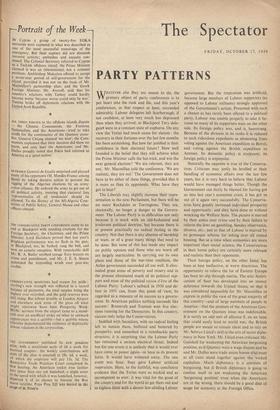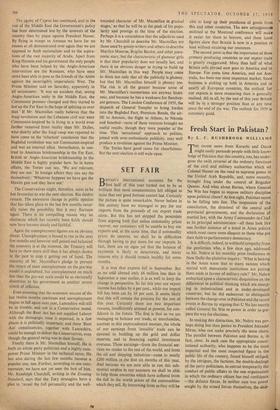PARTY PATTERNS
WHATEVER else they are meant to do, the primary object of party conferences is to put heart into the rank and file, and this year's conferences, in that respect at least, succeeded admirably. Labour delegates left Scarborough, if not confident, at least very much less depressed than when they arrived; at Blackpool Tory dele- gates were in a'constant state of euphoria. On any view the Tories had much cause for elation : the recovery in their fortunes over the last few months has been astonishing. But how far justified is their confidence in their electoral future? How well founded is the belief that they will achieve what the Prime Minister calls the hat-trick, and win the next general election? 'We are relevant, they are not,' Mr. Macmillan told the conference. 'We are realistic, they are not.' The Government does not have to be either of these things, provided that it is more so than its opponents. What have they got to beat?
The Libefals may slightly increase their repre- sentation in the next Parliament, but there will be no more Rochdales or Torringtons. They are, electorally, no longer a danger to the Govern- ment. The Labour Part' is in difficulties not only because it is stuck with an old-fashioned and irrelevant political doctrine, but because there is at present practically no radical feeling in the country. Not that there is any absence of hardship or want, or of a great many things that need to be done. But none of this has made any impact on public opinion and those who are worst off are largely inarticulate. In carrying out its own plans and those of the war-time coalition, the Attlee government succeeded all too well. It elim- inated great areas of poverty and misery and in the process eliminated much of its political sup- port and most of the political raison d'etre of the Labour Party. Labour's setback in 1950 and de- feat in 1951 can, from this point of view, be regarded as a measure of its success as a govern- ment. In American politics nothing succeeds like success : Roosevelt and Truman won five elec- tions running for the Democrats. In this country, success only helps the Conservatives.
Saddled with Socialism, with no radical feeling left to sustain them, buffeted and battered by prosperity, and enmeshed in a ramshackle party structure, it is surprising that the Labour Party has remained a serious electoral • threat. Indeed but for one event it is unlikely that it would ever have conic to power again—at least in its present form. It would have withered away. The one event was Suez. Suez gave Labour artificial respiration. Here, to the faithful, was conclusive evidence that the Tories were as wicked and as incompetent as ever; it was vital for the good of the country and for the world to get them out and to ieplace them with a decent law-abiding Labour government. But the respiration was artificial, because large numbers of Labour supporters (as opposed to Labour militants) strongly approved of the Government's action. Presented with such a chance as has rarely been offered to a political party, Labour was unable properly to take it be- cause so many of its supporters were on the other side. Its foreign policy was, and is, hamstrung. Because of the division in its ranks it is reduced to such ridiculous expedients as abstaining from voting against the American expedition to Beirut, and voting against the British expedition to Amman. Its domestic policy is irrelevant; its foreign policy is unpopular.
Naturally the opposite is true of the Conserva- tives. Criticism may justly be levelled at their handling of economic affairs over the last few years, but it is very hard to believe that Labour would have managed things better. Though the Government can fairly be blamed for having got us into last year's economic crisis, it has got us out of it again very successfully. The Conserva- tives have greatly increased individual prosperity and opportunity; and they have done so without wrecking the Welfare State. The picture is marred by their antics over crime and by their failure to reform the laws on gambling, Sunday observance, divorce, etc.; just as that of Labour is marred by its grotesque scheme for taking over •all rented housing. But at a time when economics are more important than social science, the Conservatives in their home policy are certainly more relevant and realistic than their opponents.
Their foreign policy, on the other hand, has been at best ineffective, at worst disastrous. The. opportunity to relieve the lot of Eastern Europe has been let slip through inertia. The anti-Ameri- canism of Suez has developed into an uneasy deference toward's the United States, so that it was considered impossible for Mr. Macmillan to express in public the view of the great majority of this country—and of large numbers of people in America—that the position of the American Gov- ernment on the Quemoy issue was indefensible. It is surely an odd sort of alliance if, on an issue that could easily lead to world war, the British people are meant to remain silent and to rely on Mr. Selwyn Lloyd's skill in the arts of secret diplo- macy in New York. Mr. Lloyd even criticised Mr. Gaitskell for weakening the American bargaining position, as if Quemoy were a wage dispute and he and Mr. Dulles were trade union bosses Who must at all costs stand together against 'the wicked capitalists. Much 'diplomacy is a question of bargaining, but if British diplomacy is going to confine itself to not weakening the American 'bargaining position' even when the Americans are in the wrong, there should be a good deal of scope for economy at the Foreign Office. The agony of Cyprus has continued, and in the rest of the Middle East the Government's policy has been determined less by the interests of the country than by pique against President Nasser. By flying in troops to Amman we have for no reason at all demonstrated over again that we are opposed to Arab nationalism and to the aspira- tions of the vast majority of Arabs. Apart from King Hussein and his government the only people who have been helped by the Anglo-American intervention are the Russians, who have once more been able to pose as the friends of the Arabs against the incorrigibly imperialistic West. The Prime Minister said on Saturday, apparently in all seriousness : 'It was no accident that, seeing Anglo-AmeriCan unity in the Middle East, the Communist pressure changed and they started to hot up the Far East in the hope of splitting us over that.' If Mr. Macmillan really believes that the Iraqi revolution and the Lebanese civil war were Communist-inspired he is living in a world even farther removed from reality than Mr. Dulles, who shortly after the Iraqi coup was reported to have come to the 'reluctant' conclusion that the Baghdad revolution was not Communist-inspired and was an internal affair. Nevertheless, in con- trast to American brinkmanship in the Far East, British or Anglo-American brinkmanship in the Middle East is highly popular here. So in home affairs, the Tories can say, `We are relevant, they are not.' In foreign affairs they can say (to theinselves): `Whatever happens we have got the Maxim gun and they have not.'
The Conservatives might, therefore, seem to be hot favourites to win the next election. But doubts remain. The enormous change in public opinion that has taken place in the last few months natur- ally raises the possibility that it may fluctuate again. There is no compelling reason why an electorate which has recently been fickle should now have become steady and faithful.
Again the unemployment figures are an obvious threat. Unemployment is bound to rise in the next Few months and however well poised and balanced the economy is at the moment, the Treasury will have to show more skill than it has always shown in the past to stop it getting out of hand. The sincerity of Mr. Macmillan's pledge to prevent the return of mass unemployment on the pre-war model is undoubted; but unemployment on much less than the pre-war scale could be as electorally disastrous to his government as another severe attack of inflation.
Even assuming that the economic success of the last twelve months continues and unemployment begins to fall again next year, Lancashire will still be in trouble, and not in a Conservative mood. Although the Rent Act has not supplied Labour with the demagogic issue it expected, in a fevir places it is politically important; and these `Rent Act' constituencies, together with Lancashire, :ould be enough to defeat the ConservativCs, even hough the general swing was in their favour.
Finally there is Mr. Macmillan himself. He is both an astute party politician and a highly com- petent Prime Minister in the technical sense, He has also during the last few months become a popular one, too. Further, according to one com- mentator, we have not yet seen the best of him. Mr. Randolph Churchill, writing in the Evening ,i'lantlard, says that the Tory strategists have a plan to 'reveal the full personality and the well- ell- rounded character of Mr. Macmillan in gradual stages,' so that he will be at the peak of his popu- larity and prestige at the time of the election. Perhaps it is a coincidence that the adjectives used by Mr. Churchill to describe Mr. Macmillan are those used by gossip-writers and others to describe Marilyn Monroe, Brigitte Bardot, and other pneu- matic stars; but the characteristic of glamour girls is that their popularity does not usually last, and there is an obvious danger in trying to build up Mr. Macmillan in this way. People may come to think not only that all the publicity is phoney, but that Mr. Macmillan himself is phoney too. The risk is all the greater because some of Mr. Macmillan's mannerisms are anyway histri- onic, and because he has a weakness for flamboy- ant gestures. The London Conference of 1955, the dispatch of General Templer to bring Jordan into the Baghdad Pact, Premium Bonds, the air- lift to Amman, the flight to Athens, to Nicosia and Istanbul—most of these ventures brought no useful results, though they were popular at the time. This 'sensational' approach to politics, joined with over-enthusiastic publicity, may well produce a revulsion against the Prime Minister.
The Tories have good cause for cheerfulness. But the next election is still wide open.



































 Previous page
Previous page